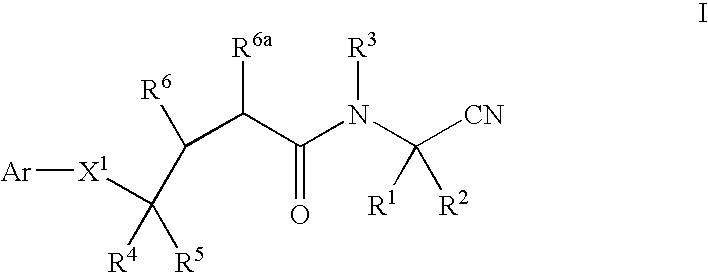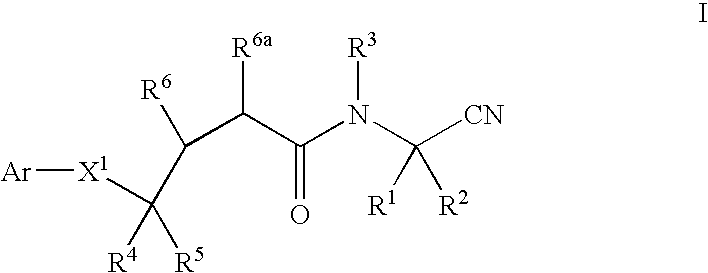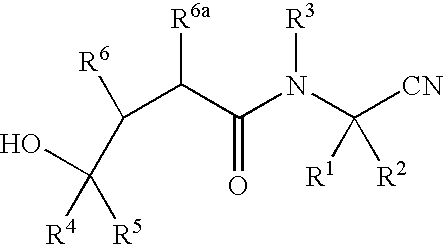Cyanoalkylamino derivatives as protease inhibitors
a technology of cyanoalkylamino and derivatives, which is applied in the field of cyanoalkylamino derivatives, can solve the problems of pathological consequences and the activeness of cysteine proteases
- Summary
- Abstract
- Description
- Claims
- Application Information
AI Technical Summary
Benefits of technology
Problems solved by technology
Method used
Image
Examples
example 5
Synthesis of trans-N-cyanomethyl-2-(4-bromophenylsulfinylmethyl)-cyclohexanecarboxamide
trans-N-Cyanomethyl-2-(4-bromophenylsulfanylmethyl)cyclohexanecarboxamide (197 mg, 0.536 mmol), prepared as in Example 1 but substituting 4-fluorothiophenol with 4-bromothiophenol, was weighed into a 50 mL round bottom flask fitted with a stirrer and vented cap. Methanol (20 mL) was added to the flask and the reaction mixture was warmed to 50° C. until a clear colorless solution formed. Added sodium periodate (128 mg, 0.599 mmol) solution in water (2.0 mL). A white precipitate slowly formed. The reaction mixture was stirred at 50° C. for 8 h and then concentrated on a rotary evaporator. The residue was triturated in hot water (20 mL) and the reaction mixture was cooled to room temperature. Solids were isolated by filtration, washed thoroughly with water and dried under high vacuum to give trans-N-cyanomethyl-2-(4-bromophenylsulfinylmethyl)cyclohexanecarboxamide as a white solid.
1H NMR (DMSO-d...
example 6
Synthesis of trans-N-cyanomethyl-2-(4-ethoxycarbonylmethylsulfanylbenzenesulfonyl-methyl)cyclohexanecarboxamide
trans-N-Cyanomethyl-2-(4-fluorobenzenesulfonylmethyl)cyclohexanecarboxamide (3.384 g, 10 mmol) and potassium carbonate (2.34 g, 17 mmol) were weighed into a 100 mL round bottom flask fitted with a stir bar and a cap. Ethyl 2-mercaptoacetate (1.86 mL) was added, followed by the addition of dimethylformamide (30 mL). The reaction vessel was flushed with nitrogen and then sealed with a cap. After stirring the reaction mixture at 100° C. for 2 h, the reaction mixture was allowed to stir overnight at room temperature. The reaction mixture was diluted with ethyl acetate (300 mL), filtered, and washed with brine. The organic layer was dried over magnesium sulfate, filtered and evaporated on a rotavap. The residue was chromatographed on 500 cm3 of silica gel in a 5×25 cm column with 50:50 dichloromethane:ethyl acetate eluent to give the title compound as a white solid. 1H NMR (...
example 7
Synthesis of trans-N-cyanomethyl-2-(4-carboxymethylsulfanylbenzenesulfonylmethyl)cyclohexanecarboxamide
trans-N-Cyanomethyl-2-(4-ethoxycarbonylsulfanylmethylbenzenesulfonylmethyl)cyclohexane-carboxamide (3 g, 6.8 mmol) was dissolved in methanol (100 mL) in a 250 mL round bottom flask filled with a stir bar and a cap. A solution of lithium hydroxide monohydrate (0.3779 g, 9 mmol) in water (30 mL) was added and the reaction mixture was stirred at room temperature for 1 h. The solvents were removed and the aqueous residue was neutralized with 1N HCl. The product was extracted with ethyl acetate, dried and concentrated to give the title compound as a white solid. 1H NMR (DMSO-d6): δ=10.85 (1H, s), 8.59 (1H, t), 7.69 (2H,dd), 7.49 (2H,dd), 4.04 (2H, d), 3.80 (2H, s), 3.37 (1H, q), 2.95 (1H, dd), 2.15 (3H, m), 1.62 (3H, m), 1.30 (1H, m), 1.16 (3H, m). MS [ESI, (M−H)−] m / z=409.3 amu.
Amide Synthesis—General Procedure
trans-N-Cyanomethyl-2-(4-carboxymethylsulfanylbenzenesulfonylmethyl)c...
PUM
| Property | Measurement | Unit |
|---|---|---|
| Volume | aaaaa | aaaaa |
| Mass | aaaaa | aaaaa |
| Fraction | aaaaa | aaaaa |
Abstract
Description
Claims
Application Information
 Login to View More
Login to View More - R&D
- Intellectual Property
- Life Sciences
- Materials
- Tech Scout
- Unparalleled Data Quality
- Higher Quality Content
- 60% Fewer Hallucinations
Browse by: Latest US Patents, China's latest patents, Technical Efficacy Thesaurus, Application Domain, Technology Topic, Popular Technical Reports.
© 2025 PatSnap. All rights reserved.Legal|Privacy policy|Modern Slavery Act Transparency Statement|Sitemap|About US| Contact US: help@patsnap.com



